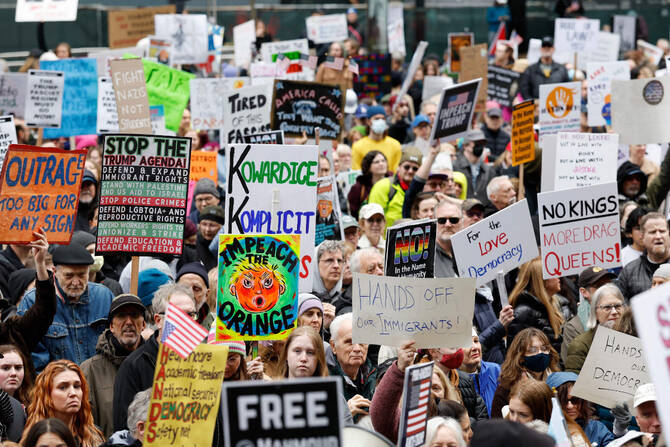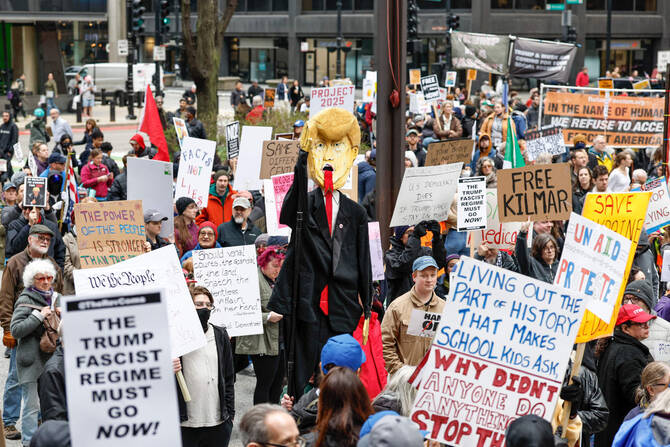NEW YORK: Thousands of protesters rallied Saturday in New York, Washington and other cities across the United States for a second major round of demonstrations against Donald Trump and his hard-line policies.
In New York, people gathered outside the city’s main library carrying signs targeting the US president with slogans like “No Kings in America” and “Resist Tyranny.”
Many took aim at Trump’s deportations of undocumented migrants, chanting “No ICE, no fear, immigrants are welcome here,” a reference to the role of the Immigration and Customs Enforcement agency in rounding up migrants.
In Washington, protesters voiced concern that Trump was threatening long-respected constitutional norms, including the right to due process.
The administration is carrying out “a direct assault on the idea of the rule of law and the idea that the government should be restrained from abusing the people who live here in the United States,” Benjamin Douglas, 41, told AFP outside the White House.
Wearing a keffiyeh and carrying a sign calling for the freeing of Mahmoud Khalil, a pro-Palestinian student protester arrested last month, Douglas said individuals were being singled out as “test cases to rile up xenophobia and erode long-standing legal protections.”
“We are in a great danger,” said 73-year-old New York protester Kathy Valy, the daughter of Holocaust survivors, adding that their stories of how Nazi leader Adolf Hitler rose to power “are what’s happening here.”
“The one thing is that Trump is a lot more stupid than Hitler or than the other fascists,” she said. “He’s being played... and his own team is divided.”
Daniella Butler, 26, said she wanted to “call attention specifically to the defunding of science and health work” by the government.
Studying for a PhD in immunology at Johns Hopkins University, she was carrying a map of Texas covered with spots in reference to the ongoing measles outbreak there.
Trump’s health chief Robert F. Kennedy Jr., a noted vaccine skeptic, spent decades falsely linking the measles, mumps, and rubella (MMR) jab to autism.
“When science is ignored, people die,” Butler said.
In deeply conservative Texas, the coastal city of Galveston saw a small gathering of anti-Trump demonstrators.
“This is my fourth protest and typically I would sit back and wait for the next election,” said 63-year-old writer Patsy Oliver. “We cannot do that right now. We’ve lost too much already.”
On the West Coast, several hundred people gathered on a beach in San Francisco to spell out the words “IMPEACH + REMOVE,” the San Francisco Chronicle reported.
Others nearby held an upside-down US flag, traditionally a symbol of distress.
Organizers hope to use building resentment over Trump’s immigration crackdown, his drastic cuts to government agencies and his pressuring of universities, news media and law firms, to forge a lasting movement.
The chief organizer of Saturday’s protests — the group 50501, a number representing 50 protests in 50 states and one movement — said some 400 demonstrations were planned.
Its website said the protests are “a decentralized rapid response to the anti-democratic and illegal actions of the Trump administration and its plutocratic allies” — and it insisted on all protests being non-violent.
The group called for millions to take part Saturday, though turnout appeared smaller than the “Hands Off” protests across the country on April 5.

















